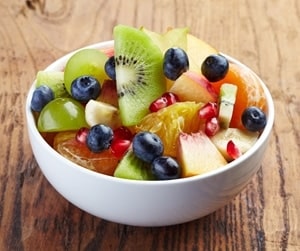 A recent study has proved that the age-old adage is in fact true, fruit can significantly reduce your risk of cardiovascular disease. Research conducted by the University of Oxford used data from nearly half a million subjects in China over several years, which suggested that those who eat fruit every day reduce their risk of CVD by 25 to 40 percent, when compared to those who never eat fruit.1 Though the benefits of a healthy diet and regular exercise have long been linked to reducing the risk of cardiovascular health problems, this study specifically emphasized the importance of fruit consumption- a focus that may contribute to the ongoing push for healthier diets, as well as advancements in pharmacy technology. Scientists believe fruit plays an essential role in providing the body with salubrious antioxidants.
A recent study has proved that the age-old adage is in fact true, fruit can significantly reduce your risk of cardiovascular disease. Research conducted by the University of Oxford used data from nearly half a million subjects in China over several years, which suggested that those who eat fruit every day reduce their risk of CVD by 25 to 40 percent, when compared to those who never eat fruit.1 Though the benefits of a healthy diet and regular exercise have long been linked to reducing the risk of cardiovascular health problems, this study specifically emphasized the importance of fruit consumption- a focus that may contribute to the ongoing push for healthier diets, as well as advancements in pharmacy technology. Scientists believe fruit plays an essential role in providing the body with salubrious antioxidants.
How antioxidants work
Free radicals are caused in the body from turning consumed food into energy, among other factors such as cigarette smoke, sun exposure and pollution.2 Free radicals have the ability to alter DNA coding and can cause bad cholesterol to more likely get tacked to an artery wall, increasing the risk of cardiovascular disease. The body has a natural defense system against free radicals but also must extract substances that fight them from food.3 Generally, nutrients that help defend the body against free radicals are grouped as an antioxidants.4 There is a wide range of beneficial antioxidants, but the most commonly known include vitamin C, vitamin E, selenium, carotenoids and manganese. A common misconception is that antioxidants all serve the same purpose. In reality, each antioxidant has specific biological properties that serve a different function in defending the body.5 Antioxidants thereby form an extensive network that benefits humans; however, to reap the advantages of antioxidants, we must adhere to a well-balanced diet. Fruits and vegetables are particularly high in antioxidants, making them prime candidates for reducing the risk of CVD and other diseases. On the other hand, processed foods with chemicals and additives potentially pose a risk of contributing more free radicals to the body. In the 1990s, scientists gained a better understanding of the deleterious role of free radicals and began highlighting the necessity of antioxidant-rich foods.6 Superfoods such as blueberries, dark chocolate, pomegranates and green tea became well-known for providing many antioxidants.7 Today, many foods highlight being rich in antioxidants as a selling point.
The study
Dr. Huaidong Du of Oxford presented the results of the seven-year study during the European Society of Cardiology (ESC) Congress in Barcelona.8 There were over 450,000 participants in the study from 10 different areas of China.9 All participants had no past history of cardiovascular disease and were not taking hypertension medication. The fruit eating habits of the subjects were then divided into four categories. The spectrum categorized subjects into groups that consumed fruit: never, monthly, 1-3 days per week and 4-6 days per week/daily.10 Researchers found that those who consumed fruits 4-6 days per week or daily had up to a 40 percent reduced risk of suffering from CVD than those who never consumed fruits.11 Medical professionals advise getting five or more servings of fruits and vegetables per day. Daily fruit consumption has a wide range of health benefits, considering the high levels of nutrients they provide. Finding ways to make quality produce affordable for Americans from all backgrounds is an ongoing challenge for the food industry, government and medical professionals. 1“Fruit Consumption Reduces Risk Of Cardiovascular Disease By Up To 40 Percent, Overall Death Risk By 32” by Rebekah Marcarelli. Headlines & Global News. September 2, 2014. http://www.hngn.com/articles/41115/20140902/daily-fruit-consumption-reduces-risk-of-cardiovascular-disease-by-up-to-40-percent-overall-death-risk-by-32.htm 2“Antioxidants: Beyond the Hype” Harvard School of Public Health. http://www.hsph.harvard.edu/nutritionsource/antioxidants/ 3“Antioxidants: Beyond the Hype” Harvard School of Public Health. http://www.hsph.harvard.edu/nutritionsource/antioxidants/ 4“Antioxidants: Beyond the Hype” Harvard School of Public Health. http://www.hsph.harvard.edu/nutritionsource/antioxidants/ 5“Antioxidants: Beyond the Hype” Harvard School of Public Health. http://www.hsph.harvard.edu/nutritionsource/antioxidants/ 6“Antioxidants: Beyond the Hype” Harvard School of Public Health. http://www.hsph.harvard.edu/nutritionsource/antioxidants/ 7“Probing Question: How do antioxidants work?” by Solmaz Barazesh. Penn State University. August 8, 2008. http://news.psu.edu/story/141171/2008/08/18/research/probing-question-how-do-antioxidants-work 8“An apple a day DOES keep the doctor away: Study finds eating fruit reduces heart disease” New York Daily News. September 3, 2014. http://www.nydailynews.com/life-style/health/study-finds-eating-fruit-reduces-heart-disease-article-1.1926024 9“An apple a day DOES keep the doctor away: Study finds eating fruit reduces heart disease” New York Daily News. September 3, 2014. http://www.nydailynews.com/life-style/health/study-finds-eating-fruit-reduces-heart-disease-article-1.1926024 10“An apple a day DOES keep the doctor away: Study finds eating fruit reduces heart disease” New York Daily News. September 3, 2014. http://www.nydailynews.com/life-style/health/study-finds-eating-fruit-reduces-heart-disease-article-1.1926024 11“An apple a day DOES keep the doctor away: Study finds eating fruit reduces heart disease” New York Daily News. September 3, 2014. http://www.nydailynews.com/life-style/health/study-finds-eating-fruit-reduces-heart-disease-article-1.1926024



